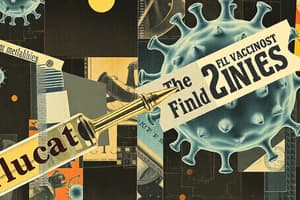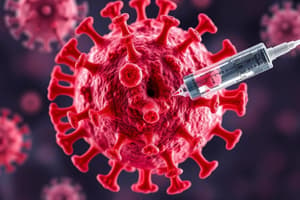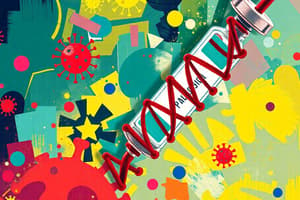Podcast
Questions and Answers
What factor has been shown as the actual cause of autism?
What factor has been shown as the actual cause of autism?
- MMR vaccines
- Sales of organic foods
- The child reaches the age of 15 months
- None of the above have been shown to cause autism (correct)
What is the main consequence of herd immunity in a population?
What is the main consequence of herd immunity in a population?
- Higher rates of vaccination refusal
- Reduction in the spread of diseases (correct)
- Enhanced effectiveness of non-vaccine treatments
- Increased risk of disease transmission
Who is at risk for contracting diseases if a mother chooses not to vaccinate her children?
Who is at risk for contracting diseases if a mother chooses not to vaccinate her children?
- Any unvaccinated person with whom her children come in contact
- Her children, herself, and her extended family
- Anyone who comes into contact with her children (correct)
- Only her unvaccinated children
What has the General Medical Council concluded about the Wakefield study?
What has the General Medical Council concluded about the Wakefield study?
What is the effect of vaccinations on the transmission rate of diseases?
What is the effect of vaccinations on the transmission rate of diseases?
What characteristic makes a scientific claim testable?
What characteristic makes a scientific claim testable?
Why are vaccines considered safe if they provoke immune responses?
Why are vaccines considered safe if they provoke immune responses?
What is the role of a vaccine in the immune response?
What is the role of a vaccine in the immune response?
What is a common misconception about vaccine safety?
What is a common misconception about vaccine safety?
Why might some mothers choose not to vaccinate their children?
Why might some mothers choose not to vaccinate their children?
How does natural immunity differ from vaccine-induced immunity?
How does natural immunity differ from vaccine-induced immunity?
What historical impact have vaccines had on public health?
What historical impact have vaccines had on public health?
What distinguishes anecdotal evidence from scientific evidence?
What distinguishes anecdotal evidence from scientific evidence?
Which of the following is an example of secondary literature?
Which of the following is an example of secondary literature?
What is the primary distinction between correlation and causation?
What is the primary distinction between correlation and causation?
What major flaw existed in the Wakefield Study which examined the relationship between the MMR vaccine and autism?
What major flaw existed in the Wakefield Study which examined the relationship between the MMR vaccine and autism?
What did the CDC attribute the increase in autism incidence to since the 1970s?
What did the CDC attribute the increase in autism incidence to since the 1970s?
Which statement accurately defines correlation?
Which statement accurately defines correlation?
Which of the following statements about the Wakefield Study is NOT accurate?
Which of the following statements about the Wakefield Study is NOT accurate?
Which of the following conclusions about linking autism and organic foods is correct?
Which of the following conclusions about linking autism and organic foods is correct?
What key aspect does correlation NOT imply?
What key aspect does correlation NOT imply?
What distinguishes a scientific claim from pseudoscience?
What distinguishes a scientific claim from pseudoscience?
Which type of literature includes actual data with controls?
Which type of literature includes actual data with controls?
Why is it important to check the credentials of the person making a scientific claim?
Why is it important to check the credentials of the person making a scientific claim?
What is a primary characteristic of secondary literature?
What is a primary characteristic of secondary literature?
How does scientific literacy benefit individuals?
How does scientific literacy benefit individuals?
Why should social media not be considered a reliable source of scientific information?
Why should social media not be considered a reliable source of scientific information?
What is essential for a source to be deemed trustworthy in the context of scientific claims?
What is essential for a source to be deemed trustworthy in the context of scientific claims?
What is the primary reason we should be cautious of claims made over social media?
What is the primary reason we should be cautious of claims made over social media?
Flashcards are hidden until you start studying
Study Notes
Vaccines
- Vaccines work by introducing a harmless form of a virus into the body, triggering an immune response that creates "memory" cells capable of fighting off future infections.
- Vaccines contain viral proteins, not genetic material, so they cannot cause the disease.
- Natural immunity occurs when the body is exposed to a virus, creating an immune response similar to a vaccine.
Vaccine Safety
- Before the development of vaccines, many children died from diseases like smallpox, diphtheria, whooping cough, and polio.
- Concerns about vaccine safety arose after studies, like the Wakefield Study, suggested a link between vaccines and autism.
- The Wakefield Study was highly flawed and its findings have been widely debunked.
- The CDC found no correlation between the MMR vaccine and autism.
- More awareness and increased screening have led to an apparent increase in autism diagnoses, but the underlying cause remains complex and not fully understood.
Evaluating Scientific Claims
- Scientific claims are statements about the natural world that can be tested using the scientific method.
- Pseudoscience is presented as scientific, but lacks evidence and is not supported by the scientific method.
- To evaluate scientific claims, consider the credibility of the source, their credentials, and any potential biases.
- Primary literature includes peer-reviewed publications with original research data, while secondary literature provides summaries or reviews of scientific findings.
- Social media is not a reliable source of scientific information due to a lack of credentials and peer review.
- Anecdotal evidence, based on personal experiences, is often unreliable and should not be taken as scientific evidence.
Correlation vs. Causation
- Correlation refers to a relationship between two events or phenomena, but it does not mean one causes the other.
- Causation occurs when one event directly leads to another.
- It is essential to distinguish between correlation and causation when evaluating scientific claims.
Herd Immunity
- Herd immunity occurs when a significant portion of a population is vaccinated, protecting those who are vulnerable or unable to be vaccinated.
- Vaccinating a large number of people reduces the spread of disease by limiting the virus's circulation.
- Choosing not to vaccinate children puts them at risk and could potentially lead to outbreaks affecting the entire community.
Studying That Suits You
Use AI to generate personalized quizzes and flashcards to suit your learning preferences.





